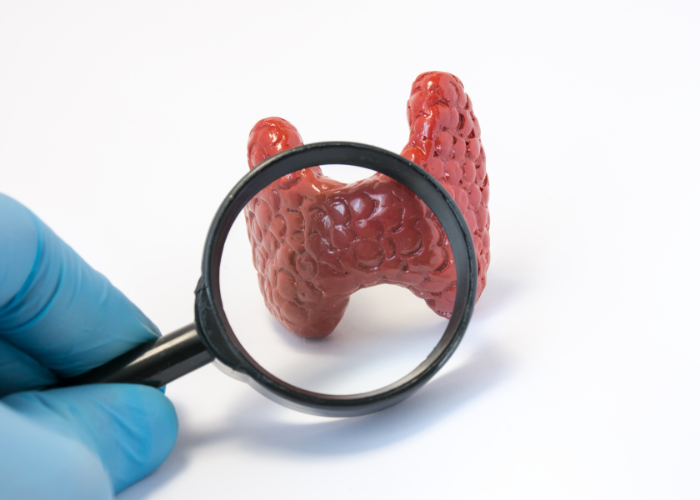FT3
What does the test show?
The test checks thyroid function by measuring the level of free triiodothyronine (FT3) produced by the thyroid gland.
Thyroid hormone production is regulated by TSH levels. Elevated TSH levels increase thyroid production of T3 (triiodothyronine) and T4 (thyroxine). These hormones can react to TSH production, which is then reduced. As a result of reduced TSH levels, thyroid hormone production also decreases. The lowered T3 and T4 levels result in an increase in TSH production. This interacting system eventually reaches a state of equilibrium, reflecting the health of the thyroid gland.
T3 and T4 are produced by the same processes, the difference between the two is only 1 iodine atom. In the blood, these hormones are found bound to different proteins or free. The free hormones (free – F) are biologically active and therefore of diagnostic importance and can be tested in our laboratory.

When is it recommended to have the test?
The test is recommended if the TSH (in some cases FT4) laboratory test result is inadequate or if the patient has symptoms typical of thyroid disease.
Symptoms of hyperthyroidism:
- Anxiety and mood swings
- Irritability
- Weakness in the arms and legs
- Sleep problems
- Hand tremors
- Sweating
- Low heat tolerance
- Irregular heartbeat
- Extreme fatigue
- Unexplained weight loss
- More frequent bowel movements than usual
- Eye irritation or bulging eyes
- Menstrual irregularities
- Enlarged breasts and erectile dysfunction in men
- Thinning of hair
- High blood sugar levels
- Shortness of breath
- More frequent urination
Symptoms of hypothyroidism:
- Extreme fatigue
- Low tolerance to cold
- Weight gain
- Hair loss
- Swelling around the eyes
- Slower heartbeat
- Shortness of breath
- Constipation
- Menstrual irregularities
- Loss of consciousness (rare)
What sample is needed for the test?
The test requires a blood sample taken from a vein.
What can the result indicate?
The result helps to paint a proper picture of the condition of the thyroid. It has no diagnostic value on its own, and it is recommended to be tested in combination with other hormones that indicate thyroid function (e.g. TSH, FT4, and in some cases thyroglobulin, anti-TPO, anti-thyroglobulin and calcitonin). It is in the context of these that appropriate information about thyroid health can be obtained.
What to do after the test?
The test alone cannot diagnose any disease, so you should always consult an endocrinologist or an internist with the results to determine the exact diagnosis and the necessary therapy.

